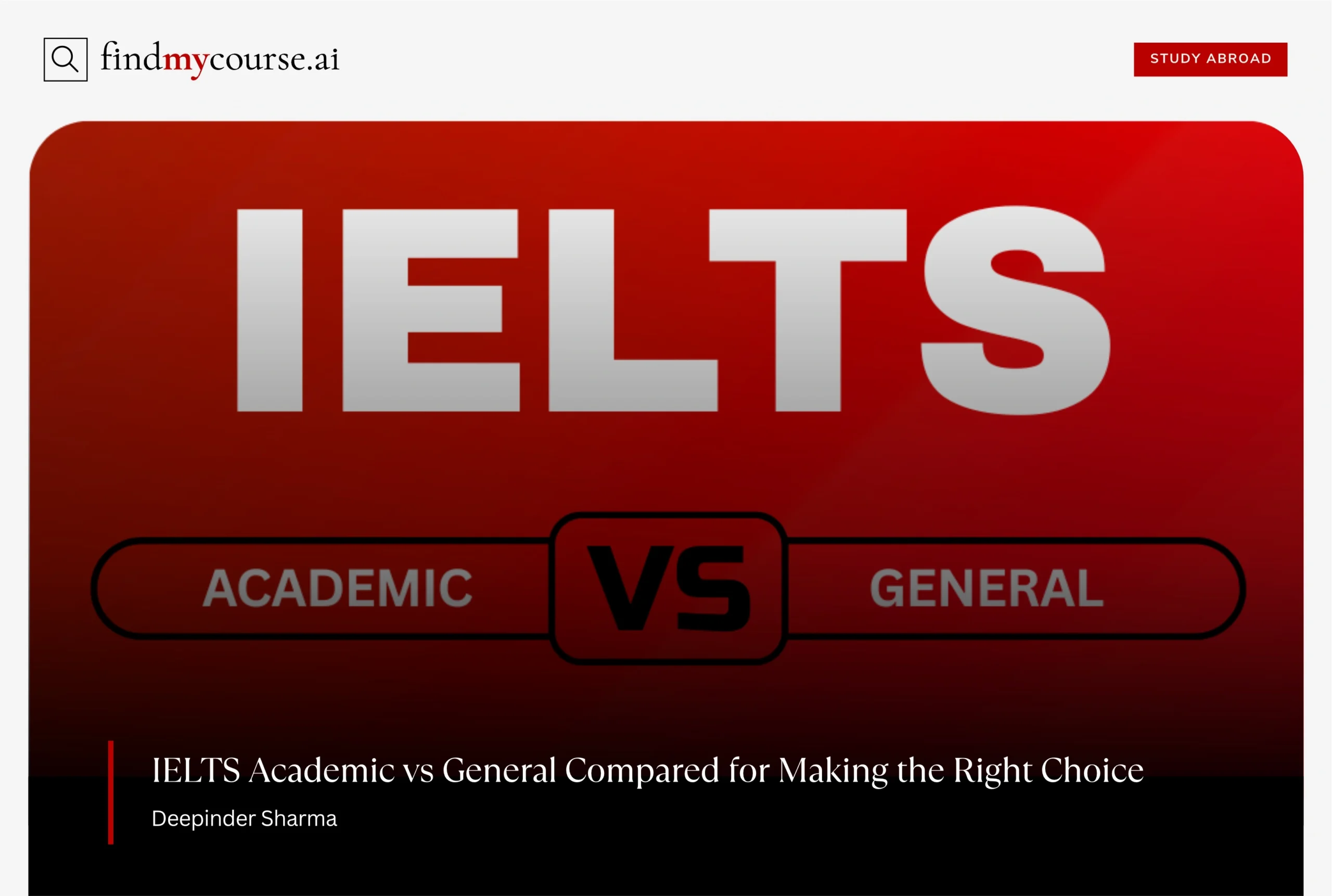If you’re planning to study abroad, migrate, or work in an English-speaking country, taking an IELTS test is often a crucial step. However, with two distinct options—IELTS Academic and General Training—choosing the right one can feel overwhelming. Understanding the differences, purpose, and which test aligns with your goals will help you make a confident decision and achieve your desired score. Whether you aim to enroll in a university, advance your career, or meet immigration requirements, this guide on IELTS Academic vs General will clarify everything you need to know.
Understanding IELTS Academic vs General
The IELTS test measures your English proficiency across Listening, Reading, Writing, and Speaking. While Listening and Speaking are the same for both modules, the Reading and Writing sections differ to suit specific purposes.
IELTS Academic
- Designed for higher education and professional registration.
- Evaluates the ability to understand complex texts, interpret data, and communicate ideas in formal academic English.
- Prepares test-takers for university-level coursework or professions requiring advanced English.
IELTS General Training
- Geared toward work, migration, or vocational training.
- Focuses on practical English for everyday life, workplace communication, and social interactions.
- Equips test-takers with skills needed for daily life or professional environments where academic-level English is not required.
Key Differences between IELTS Academic vs General
| Section | IELTS Academic | IELTS General Training |
| Reading | •Passages from books, journals, and articles •Focus on analysis and comprehension | •Everyday materials (notices, advertisements, workplace documents) •Focus on practical understanding |
| Writing | •Task 1: Describe visual data (charts, graphs, diagrams) •Task 2: Formal essay on an academic topic | •Task 1: Write a letter (formal, semi-formal, or informal) •Task 2: Essay on a general topic |
| Listening | •Same for both modules •Includes conversations and monologues in everyday and academic contexts | •Same as Academic |
| Speaking | •Face-to-face interview with an examiner •Same format for both modules | •Same as Academic |
| Skills Tested | •Analytical thinking •Academic vocabulary •Formal writing style | •Clear communication in daily situations •Informal and formal writing •Practical English use |
IELTS Academic vs General: Which One Should You Take?
Understanding the distinct focus of each IELTS module can help you choose the one that best fits your goals.
Who Should Take IELTS Academic?
IELTS Academic is ideal if you:
- Plan to study at a university or college at undergraduate or postgraduate level.
- Need professional registration in fields like medicine, engineering, law, or other regulated professions.
- Aim to pursue research, higher education, or academic training in an English-speaking environment.
Who Should Take IELTS General Training?
IELTS General Training is the preferred choice if you:
- Plan to migrate to countries like Canada, Australia, the UK, or New Zealand for work or residency.
- Want to undertake vocational training or non-degree studies.
- Need to demonstrate English proficiency for social and workplace communication.
Preparing for IELTS: Tips and Strategies
Proper preparation is essential, whether you choose IELTS Academic or General Training. A well-structured plan not only builds confidence but also ensures you perform at your best on test day. Here are some effective strategies:
- Understand the Test Format
- Familiarize yourself with structure, timing, and question types for each section.
- Knowing what to expect reduces surprises and helps manage time.
- Practice Regularly
- Take mock tests under timed conditions.
- Improves speed, highlights weaknesses, and builds test-day confidence.
- Develop All Four Skills
- Reading: Read books, newspapers, and online articles to improve comprehension and vocabulary.
- Listening: Listen to podcasts, lectures, or news reports in English.
- Writing: Academic: describe charts and write essays. General: practice letters and essays.
- Speaking: Join conversation clubs, record yourself, or speak with peers to enhance fluency.
- Use Official Materials
- Practice with authentic IELTS resources for realistic scenarios and question types.
- Focus on Weak Areas
- Dedicate extra time to sections that challenge you the most.
By following these strategies, you can approach the IELTS test with confidence, clarity, and a clear understanding of your strengths and weaknesses, increasing your chances of achieving the score you need.
Mistakes to Avoid
Many IELTS candidates lose marks because of simple, preventable errors. Being aware of these pitfalls and preparing strategically can help you maximize your score.
- Choose the right module: Confirm whether Academic or General Training fits your goals.
- Manage time effectively: Avoid leaving questions incomplete, especially in Reading and Writing.
- Prioritize clarity: Clear, simple answers often score higher than overly complex sentences.
- Practice all four skills: Don’t neglect Speaking or Listening.
- Review mistakes: Learn from practice tests rather than just completing them.
- Follow instructions carefully: Pay attention to word counts and task requirements.
Final Thoughts
Ultimately, choosing between IELTS Academic vs General depends on your goals. Academic is ideal for higher education and professional careers, while General suits work, migration, and everyday English. Picking the right module ensures focused preparation and a higher chance of success, and if you need any guidance, just ask our AI assistant to make better choices.
FAQs
Q1: Can I switch between IELTS Academic and General after booking?
A: No, you must choose the correct module before booking, as changes are not allowed.
Q2: Are the Speaking and Listening sections the same for both modules?
A: Yes, these sections are identical in both Academic and General Training.
Q3: Which module is easier?
A: It depends on your strengths. Academic is more challenging due to academic-focused content.
Q4: How can I prepare effectively?
A: Practice regularly, understand the test format, and use official preparation materials.
Q5: Do I need IELTS for migration purposes?
A: Yes, most immigration authorities require IELTS General Training for visa applications.


